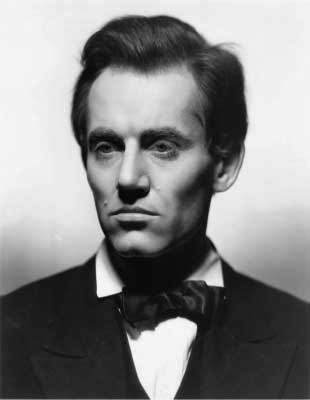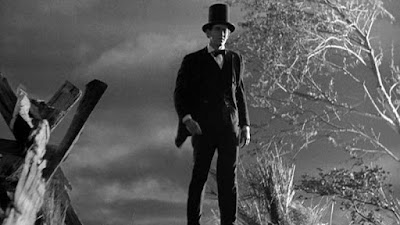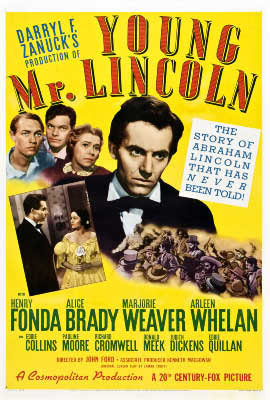Damn, I kept waiting for the vampires to show up, but they never did. Not
a one *. How could John Ford have left them out. I guess they came along
later in Abe Lincoln's life. Instead, Ford digs deep into the Americana of
the past, grasping the goodness and decency that is there, reminding us that
once we were a great nation, that once truth mattered, that once there was
a right and a wrong. It seems all mixed up now and perhaps it did back in
1939 as the country was still recovering from the tragic years of the Great
Depression and a war was on the horizon. A war for democracy. The same as
Lincoln fought for 80 years previously.

The film is just a sliver of Lincoln's life before he became famous and revolves
primarily around a murder trial. But the trial (which was very loosely based
on a real event) isn't really the point - it is small town values, it is
honor, it is family, it is justice that matters. And Lincoln who imbues all
this and so much more. The magic of the film is that Ford never really hints
at the greatness that is in Lincoln's future - he understands that the audience
knows that - this awkward ungainly tall man in his stove-top hat with his
folksy home-grown humor and wisdom was going to save the Union, free the
slaves with the Emancipation Proclamation, give the ageless Gettysburg Address,
show great mercy and be assassinated for doing so. We know how it ends. So,
we fill in the dots, we bring our own emotion to the film, we are humbled
by seeing the future. When finally at the end Ford gives into the legend
as Lincoln walks towards his destiny and The Battle Hymn of the Republic
breaks into the silence, it is a gulp of relief. He is on his way.

When Ford approached Henry Fonda to play the lead role, he initially declined.
I can't play a great man like that. But Ford insisted and after seeing how
he looked with the lengthened nose (nearly unrecognizable), he agreed. Fonda
was on the cusp of greatness with three Ford films in a row - this one, Drums
Along the Mohawk and The Grapes of Wrath. My Darling Clementine, Fort Apache
and Mr. Roberts were further into the future. In this same year Ford made
another star - John Wayne in Stagecoach. These two actors were in a sense
two sides of the coin - Fonda sensitive and reticent and Wayne the bigger
than life brawler. It is hard to imagine any role that would have worked
if they had switched places. Fonda is brilliant in this - he makes Lincoln
a real person with his ah shucks humor, barbs, dignity and grace - but never
over does it - his acting never is but in the moment. Nobody in the film
goes, I bet he will be great someday - they just thought he was Abe, small
town Abe who talked slowly but always has a point.

The film begins with the death of his first (and historians think only love)
Ann Rutledge (Pauline Moore) when he decides that he will follow her wishes
and become a lawyer. He sets up a law firm in a low rent office and waits
patiently for customers. He is a well-liked character for his log splitting,
pie eating and jokes. Into his orbit comes Stephen Douglas (his future political
opponent) and Mary Todd (his future wife). These were obviously tumultuous
political times as the fractures within the country were deepening but Lincoln
is showing little political ambition at this point and slavery is never mentioned
in the film. In a fight between the sheriff and two young men, the sheriff
is killed with a knife and the two men are almost lynched till Lincoln intervenes
and disarms the mob with his humor and quotes from the bible. He defends
them. In Ford's films it is the quiet reflective scenes that most effect
you - by the grave of Ann, his reading a letter from one the defendants to
their mother and two sisters, the family huddling in the jail cell singing
and praying the night before the verdict, Abe saying goodbye to them and
walking away. Perfect moments of cinema. A lovely quiet film that steals
into your emotional core.
* - bad attempt at humor referencing the classic film Abraham Lincoln: Vampire
Hunter (2012)





